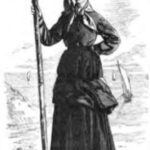Diego de Saavedra Fajardo wrote his work “Idea de un príncipe político-cristiano” in a truly decisive context in the struggle for European hegemony. His experience in the main European courts allowed him to come into contact with the high politics of the old continent and, consequently, he wrote this work with an instructive character for the young kings of the Hispanic Monarchy. In this particular fragment, Fajardo seems to refer to the population problem suffered by the peninsula due to demographic shortages. Already at the end of the 16th century, the extraordinary efforts to maintain the empire had caused a demographic recession in Castile, which was compounded by other factors arising from the complicated 17th century. The population count was indeed one of the most important muscles of the monarchies, because in addition to ensuring tax collection, it allowed armies to be enrolled in accordance with the population’s capacity. Faced with this precarious population situation, the France of Louis XIV, which was a kingdom, had 20 million inhabitants, which enabled the Sun King to build the largest armies in Europe. The demographic problem in Spain would be tackled by the Bourbon dynasty in the 18th century, facilitating new repopulation projects both by state initiative and by private individuals (nobility).
Collection: Texts
Chronology: XVII
Scope: Secondary Education, Baccalaureate, University
Link: http://rua.ua.es/dspace/handle/10045/4635
Resource type: Historical source
Source: Diego de SAAVEDRA Y FAJARDO: Idea de un Príncipe Político-Cristiano. Edic.B. A. E.Madrid 1947, p.181
Language: Spanish
Date: 1640
Owner: Djebril Bouzidi (Modernalia)
Identifier: Diego de SAAVEDRA Y FAJARDO: Idea de un Príncipe Político-Cristiano. Edic.B. A. E.Madrid 1947, p.181
Abstract: Fragment of text in which Diego de Saavedra Fajardo insists on the importance of the number of vassals in the states of a monarch
Tags





